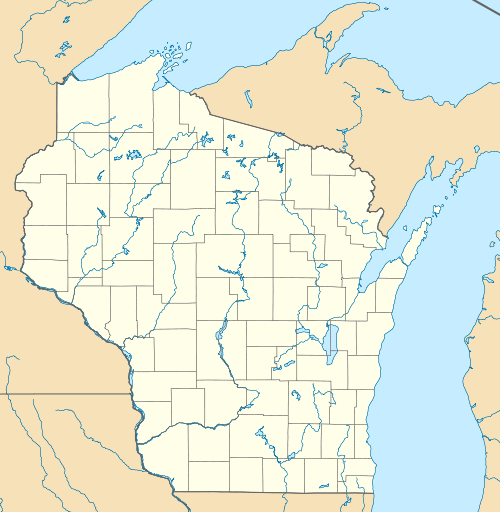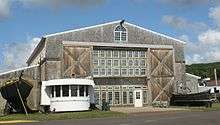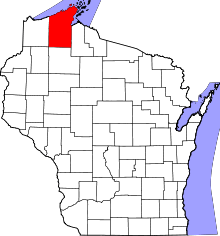Bayfield, Wisconsin
| Bayfield | |
|---|---|
| City | |
|
Bayfield from the harbor | |
 Bayfield Location within the state of Wisconsin | |
| Coordinates: 46°48.7′N 90°49.2′W / 46.8117°N 90.8200°WCoordinates: 46°48.7′N 90°49.2′W / 46.8117°N 90.8200°W | |
| Country | United States |
| State | Wisconsin |
| County | Bayfield |
| Area[1] | |
| • Total | 0.87 sq mi (2.25 km2) |
| • Land | 0.86 sq mi (2.23 km2) |
| • Water | 0.01 sq mi (0.03 km2) |
| Population (2010)[2] | |
| • Total | 487 |
| • Estimate (2012[3]) | 488 |
| • Density | 566.3/sq mi (218.6/km2) |
| Time zone | Central (CST) (UTC-6) |
| • Summer (DST) | CDT (UTC-5) |
| ZIP codes | 54814 |
| Area code(s) | 715 and 534 |
| Website |
cityofbayfield |
Bayfield is a city in Bayfield County, Wisconsin, United States. The population was 530 at the 2010 census.[4] The town is named after Henry Bayfield, a British Royal Topographic Engineer who explored the region in 1822-23.[5]
Wisconsin Highway 13 serves as a main arterial route in the community. It is a former county seat, lumbering town and commercial fishing community, which today is a tourist and resort destination. There are many restaurants, hotels, bed & breakfasts establishments, specialty shops, and marine services.
History
Bayfield was named in 1856.[6] A post office has been in operation at Bayfield since 1856.[7]
Geography
Bayfield is located at 46°48.7′N 90°49.2′W / 46.8117°N 90.8200°W (46.8115, -90.8203).[8]
According to the United States Census Bureau, the city has a total area of 0.87 square miles (2.25 km2), of which, 0.86 square miles (2.23 km2) is land and 0.01 square miles (0.03 km2) is water.[1]
Bayfield is considered the main gateway to the Apostle Islands National Lakeshore, a world-famous freshwater sailing, boating and kayaking destination on Lake Superior. Madeline Island, the largest of the Apostle Islands and the only one with private residences, is another popular destination near Bayfield. The ferry to Madeline Island links Bayfield with La Pointe, Wisconsin, a town on the island.
Demographics
| Historical population | |||
|---|---|---|---|
| Census | Pop. | %± | |
| 1880 | 495 | — | |
| 1890 | 1,373 | 177.4% | |
| 1900 | 1,689 | 23.0% | |
| 1920 | 1,441 | — | |
| 1930 | 1,195 | −17.1% | |
| 1940 | 1,212 | 1.4% | |
| 1950 | 1,153 | −4.9% | |
| 1960 | 969 | −16.0% | |
| 1970 | 874 | −9.8% | |
| 1980 | 778 | −11.0% | |
| 1990 | 686 | −11.8% | |
| 2000 | 611 | −10.9% | |
| 2010 | 487 | −20.3% | |
| Est. 2015 | 479 | [9] | −1.6% |
2010 census
As of the census[2] of 2010, there were 487 people, 261 households, and 130 families residing in the city. The population density was 566.3 inhabitants per square mile (218.6/km2). There were 482 housing units at an average density of 560.5 per square mile (216.4/km2). The racial makeup of the city was 77.8% White, 0.2% African American, 14.8% Native American, 1.0% Asian, and 6.2% from two or more races. Hispanic or Latino of any race were 1.8% of the population.
There were 261 households of which 16.5% had children under the age of 18 living with them, 39.5% were married couples living together, 8.8% had a female householder with no husband present, 1.5% had a male householder with no wife present, and 50.2% were non-families. 44.1% of all households were made up of individuals and 18.7% had someone living alone who was 65 years of age or older. The average household size was 1.87 and the average family size was 2.58.
The median age in the city was 53.2 years. 15.4% of residents were under the age of 18; 3.2% were between the ages of 18 and 24; 18.6% were from 25 to 44; 36% were from 45 to 64; and 26.9% were 65 years of age or older. The gender makeup of the city was 48.9% male and 51.1% female.
2000 census
As of the census[11] of 2000, there were 611 people, 289 households, and 167 families residing in the city. The population density was 703.3 people per square mile (271.2/km²). There were 403 housing units at an average density of 463.8 per square mile (178.8/km²). The racial makeup of the city was 76.92% White, 0.65% Black or African American, 15.22% Native American, 1.31% from other races, and 5.89% from two or more races. Hispanic or Latino of any race were 0.49% of the population. 10.5% were of American, 10.1% German, 9.4% Norwegian, 8.1% Irish, 7.4% Swedish and 5.4% English ancestry according to Census 2000.
There were 289 households out of which 22.8% had children under the age of 18 living with them, 41.2% were married couples living together, 11.4% had a female householder with no spouse present, and 41.9% were non-families. 35.6% of all households were made up of individuals and 15.9% had someone living alone who was 65 years of age or older. The average household size was 2.10 and the average family size was 2.64.
In the city the population was spread out with 20.9% under the age of 18, 6.9% from 18 to 24, 21.4% from 25 to 44, 33.1% from 45 to 64, and 17.7% who were 65 years of age or older. The median age was 45 years. For every 100 females there were 89.8 males. For every 100 females age 18 and over, there were 85.8 males.
The median income for a household in the city was $32,266, and the median income for a family was $36,500. Males had a median income of $34,375 versus $25,875 for females. The per capita income for the city was $18,377. About 10.5% of families and 11.8% of the population were below the poverty line, including 20.5% of those under age 18 and 4.6% of those age 65 or over.
Arts and culture

The city of Bayfield is known in the Anishinaabe language as Oshki-oodena ("New-town"), opposed to Superior, Wisconsin, which is known as Gete-oodena ("Old-town"), in reference to the Ojibwa migration.
The Bayfield Maritime Museum and Bayfield Heritage Museum are the city’s two museums. There are several art galleries. Nearby is the 950 seat all-canvas tent theater known as Big Top Chautauqua which during its summer season has hosted such entertainers as Willie Nelson and Lyle Lovett.[12]
Bayfield’s annual Apple Fest draws about 60,000 visitors during the first weekend in October. Popular summertime events include Bayfield Race Week regatta, held during the week of the 4th of July and the Festival of Arts and Gallery Tour, which takes place the third weekend of July. It features artists from across the midwest, along with tours and demos at a diverse array of local galleries. In wintertime, the Apostle Islands Sled Dog Race is the largest sled dog race in the midwest with between 50 and 75 teams competing annually. It takes place the first weekend of February.
Local media
Bayfield receives three radio stations from Ashland; WATW, WBSZ and WJJH. Television stations come from the Duluth–Superior market; KDLH, KBJR, WDSE and WDIO.
Gallery
-

The headquarters of the Apostle Islands National Lakeshore, in Bayfield, is actually made out of rock quarried from the islands before they were made a park
-

Downtown Bayfield
-

Rittenhouse Inn
-

City hall
-

Bayfield Marina
-

Bayfield sign
-

Bayfield, Wisconsin seen from the harbor
Notable people
- Laurie E. Carlson, Wisconsin State Assemblyman, 1937–42, born in Bayfield
- Norris J. Nelson, Los Angeles City Council member, 1939–43, born in Bayfield
- Nathan Van Cleave, Composer for Television, including "The Twilight Zone," born in Bayfield
See also
References
- 1 2 "US Gazetteer files 2010". United States Census Bureau. Archived from the original on 2012-01-24. Retrieved 2012-11-18.
- 1 2 "American FactFinder". United States Census Bureau. Retrieved 2012-11-18.
- ↑ "Population Estimates". United States Census Bureau. Archived from the original on 2013-06-17. Retrieved 2013-06-24.
- ↑ http://factfinder2.census.gov/faces/tableservices/jsf/pages/productview.xhtml?pid=ACS_10_5YR_B01003&prodType=table
- ↑ Eckert, Kathryn Bishop (2000). The sandstone architecture of the Lake Superior region. Wayne State University Press. ISBN 978-0-8143-2807-1. Retrieved 18 August 2011.
- ↑ Chicago and North Western Railway Company (1908). A History of the Origin of the Place Names Connected with the Chicago & North Western and Chicago, St. Paul, Minneapolis & Omaha Railways. p. 168.
- ↑ "Bayfield County". Jim Forte Postal History. Retrieved 3 April 2015.
- ↑ "US Gazetteer files: 2010, 2000, and 1990". United States Census Bureau. 2011-02-12. Retrieved 2011-04-23.
- ↑ "Annual Estimates of the Resident Population for Incorporated Places: April 1, 2010 to July 1, 2015". Retrieved July 2, 2016.
- ↑ "Census of Population and Housing". Census.gov. Archived from the original on May 11, 2015. Retrieved June 4, 2015.
- ↑ "American FactFinder". United States Census Bureau. Archived from the original on 2013-09-11. Retrieved 2008-01-31.
- ↑ Big Top Chautauqua
External links
- City of Bayfield
- Bayfield Chamber of Commerce
- Sanborn fire insurance maps: 1886 1892 1898 1904 1911


